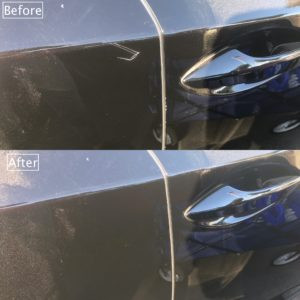Who Fixes Car AC Near Me? Find Local Experts
Is your car’s air conditioning blowing hot air? Finding reliable “Who Fixes Car Ac Near Me” shouldn’t be a stressful ordeal. Your car’s AC system keeps you comfortable. When it fails, you need a trusted auto repair shop to restore cool air quickly and efficiently. CARDIAGTECH.NET offers top-notch diagnostic tools and equipment that professionals rely on to fix AC issues effectively. Discover the best local AC repair solutions and understand the costs involved.
1. Understanding Your Car’s AC System
Before diving into the repair process and the search for “Who Fixes Car Ac Near Me,” it’s helpful to understand the basic components of your car’s air conditioning system. Known as the HVAC (Heating, Ventilation, and Air Conditioning) system, it’s a complex mechanism designed to cool, heat, and purify the air inside your vehicle.
1.1. Key Components of the HVAC System
Understanding these components helps you better communicate with technicians and understand the necessary repairs.
| Component | Function |
|---|---|
| Compressor | Compresses refrigerant gas, creating high-pressure, heated gas. |
| Condenser | Cools the high-pressure gas, turning it into a liquid. |
| Dryer/Receiver | Removes moisture and contaminants from the refrigerant. |
| Expansion Valve/Orifice Tube | Regulates refrigerant flow into the evaporator. |
| Evaporator | Absorbs heat from the cabin air, turning the liquid refrigerant back into a gas. |
| Blower Motor | Circulates air across the evaporator and into the cabin. |
1.2. The Refrigerant Cycle
The HVAC system works by cycling refrigerant through these components, changing its state from gas to liquid and back again.
- The compressor pressurizes the refrigerant gas, making it hot.
- This hot gas flows to the condenser, where it cools down and becomes a high-pressure liquid.
- The liquid refrigerant passes through the dryer to remove any moisture.
- It then goes to the expansion valve, which reduces the pressure and regulates the flow into the evaporator.
- In the evaporator, the refrigerant absorbs heat from the cabin, cooling the air, and turns back into a gas.
- Finally, the gas returns to the compressor to start the cycle again.
1.3. Why Regular Maintenance Matters
Regular maintenance ensures the system operates efficiently. As specified by the U.S. Department of Energy, neglecting your car’s AC can lead to decreased performance, higher fuel consumption, and costly repairs. Proper upkeep not only extends the life of your AC system but also ensures you stay comfortable on the road.
2. Common Car AC Problems Requiring Professional Attention
When searching for “who fixes car AC near me,” you need to know the specific problems you’re dealing with. Here are some common AC issues that require professional attention.
2.1. Refrigerant Leaks
Refrigerant leaks are a common cause of AC failure. Over time, hoses and seals can degrade, leading to leaks. A low refrigerant level reduces the AC’s cooling capacity.
Signs of a Refrigerant Leak:
- Weak or no cold air
- Hissing sound from the AC system
- Visible oily residue near AC components
Repair Cost:
- Leak detection: $50 – $150
- O-ring replacement: $20 – $50 (parts) + labor
- Hose replacement: $50 – $200 (parts) + labor
2.2. Compressor Issues
The compressor is the heart of the AC system. If it fails, the entire system stops working. Compressors can fail due to age, lack of lubrication, or internal damage.
Signs of a Faulty Compressor:
- No cold air
- Loud noises when the AC is turned on
- Compressor clutch not engaging
Repair Cost:
- Compressor replacement: $400 – $1200 (parts and labor)
2.3. Condenser Problems
The condenser cools the refrigerant. Damage from road debris or corrosion can reduce its efficiency or cause it to leak.
Signs of a Damaged Condenser:
- AC not cooling properly, especially at low speeds
- Visible damage to the condenser fins
- Refrigerant leaks
Repair Cost:
- Condenser replacement: $300 – $800 (parts and labor)
2.4. Expansion Valve or Orifice Tube Blockage
The expansion valve or orifice tube regulates refrigerant flow. If blocked, it can restrict refrigerant flow, reducing cooling efficiency.
Signs of a Blocked Expansion Valve/Orifice Tube:
- AC blowing warm air
- Frost on AC lines
- Compressor cycling on and off rapidly
Repair Cost:
- Expansion valve replacement: $100 – $300 (parts and labor)
- Orifice tube replacement: $50 – $150 (parts and labor)
2.5. Electrical Issues
Electrical problems can prevent the AC from working correctly. Issues can range from blown fuses to faulty wiring or a bad control module.
Signs of Electrical Issues:
- AC not turning on
- Intermittent cooling
- Blown fuses
Repair Cost:
- Electrical diagnosis: $75 – $150
- Fuse replacement: $5 – $20
- Wiring repair: $50 – $200 + labor
.jpg)
3. Finding Reliable AC Repair Services Near You
When searching for “who fixes car AC near me,” consider these factors to ensure you find a reliable service provider.
3.1. Online Reviews and Ratings
Check online reviews on platforms like Google, Yelp, and Facebook. Look for consistent positive feedback regarding AC repair services. According to a 2023 survey by BrightLocal, 88% of consumers trust online reviews as much as personal recommendations.
3.2. Certifications and Affiliations
Ensure the repair shop has certified technicians. Certifications like ASE (Automotive Service Excellence) indicate a high level of competence.
3.3. Warranty and Guarantees
Choose a shop that offers a warranty on their AC repair services. A warranty protects you if the same problem recurs shortly after the repair.
3.4. Transparent Pricing
A reputable repair shop should provide a detailed estimate before starting any work. This estimate should include the cost of parts, labor, and any additional fees.
3.5. Diagnostic Capabilities
Modern AC systems require advanced diagnostic tools. Ensure the shop has the necessary equipment to accurately diagnose the problem. CARDIAGTECH.NET provides state-of-the-art diagnostic tools to help technicians pinpoint AC issues quickly.
3.6. Location and Convenience
Choose a repair shop that is conveniently located. Consider factors like hours of operation, availability of loaner cars, and shuttle services.
4. Understanding the Costs of Car AC Repair
The cost of car AC repair varies depending on the problem, the make and model of your vehicle, and the repair shop you choose. Here’s a detailed breakdown of potential costs.
4.1. Diagnostic Fee
Most shops charge a diagnostic fee to identify the problem. This fee typically ranges from $75 to $150.
4.2. Common AC Repairs and Their Costs
| Repair | Average Cost (Parts & Labor) | Description |
|---|---|---|
| Refrigerant Recharge | $150 – $300 | Refilling the AC system with refrigerant. |
| Leak Repair (O-rings) | $80 – $200 | Replacing worn or damaged O-rings. |
| Hose Replacement | $150 – $400 | Replacing damaged AC hoses. |
| Compressor Replacement | $400 – $1200 | Replacing the AC compressor. |
| Condenser Replacement | $300 – $800 | Replacing the condenser. |
| Expansion Valve/Orifice Tube | $100 – $300 | Replacing the expansion valve or orifice tube. |
| Cabin Air Filter Replacement | $30 – $70 | Replacing the cabin air filter. |
| Electrical Repair | $75 – $250+ | Diagnosing and repairing electrical issues. |
4.3. Factors Affecting Repair Costs
- Vehicle Make and Model: Luxury and high-performance vehicles often have more expensive parts.
- Labor Rates: Labor rates vary by location and shop. Urban areas typically have higher labor rates.
- Part Quality: Using OEM (Original Equipment Manufacturer) parts can increase the cost but ensures quality and compatibility.
4.4. Getting an Accurate Estimate
To get an accurate estimate, provide the repair shop with as much information as possible about the problem. This includes:
- Symptoms you’re experiencing (e.g., weak airflow, warm air)
- Any recent repairs or maintenance
- Vehicle make, model, and year
5. Step-by-Step Guide to Finding the Best “Who Fixes Car AC Near Me”
Follow these steps to find the best local AC repair service.
5.1. Identify the Problem
Recognize the symptoms. Is the air not cold, are there unusual noises, or is there a strange smell? This helps the technician diagnose the issue faster.
5.2. Online Search
Use search engines like Google to search for “who fixes car AC near me.” Look at the top results and check their reviews and ratings.
5.3. Check Reviews and Ratings
Read reviews on multiple platforms. Pay attention to comments about AC repair specifically.
5.4. Verify Certifications
Check if the shop has certified technicians. ASE certification is a good indicator of competence.
5.5. Request Estimates
Contact several shops and request estimates. Provide detailed information about the problem.
5.6. Compare Estimates
Compare the estimates. Don’t just focus on the lowest price. Consider the shop’s reputation, warranty, and the quality of parts used.
5.7. Ask Questions
Ask the shop questions about their diagnostic process, repair methods, and warranty. A reputable shop will be happy to answer your questions.
5.8. Schedule the Repair
Once you’ve chosen a shop, schedule the repair. Confirm the estimate and warranty before leaving your vehicle.
6. DIY vs. Professional AC Repair
While some minor AC issues can be addressed with DIY solutions, most problems require professional intervention.
6.1. DIY Solutions
- Cabin Air Filter Replacement: Replacing a dirty cabin air filter is a simple DIY task.
- Refrigerant Recharge Kits: These kits can temporarily address low refrigerant levels, but they don’t fix leaks.
6.2. When to Seek Professional Help
- Refrigerant Leaks: These require specialized equipment to detect and repair.
- Compressor Issues: Compressor replacement requires technical expertise and specialized tools.
- Electrical Problems: Diagnosing and repairing electrical issues can be complex and dangerous without proper training.
According to the EPA, improper handling of refrigerants can harm the environment. Professional technicians are trained to handle refrigerants safely and responsibly.
7. Maximizing the Lifespan of Your Car’s AC System
Proper maintenance can extend the life of your AC system and prevent costly repairs.
7.1. Regular AC Servicing
Have your AC system serviced annually. This includes checking refrigerant levels, inspecting components, and cleaning the condenser fins.
7.2. Check Cabin Air Filter
Replace the cabin air filter every 12,000 to 15,000 miles, or more frequently if you drive in dusty conditions.
7.3. Use AC Regularly
Use your AC system regularly, even in the winter. This helps keep the components lubricated and prevents seals from drying out.
7.4. Avoid Overloading the System
Avoid setting the AC to the coldest setting immediately. Gradually decrease the temperature to avoid overworking the compressor.
7.5. Address Issues Promptly
Address any AC issues promptly. Ignoring minor problems can lead to more significant and costly repairs.
8. The Role of CARDIAGTECH.NET in Ensuring Quality AC Repairs
CARDIAGTECH.NET supports auto repair shops by providing high-quality diagnostic tools and equipment.
8.1. Advanced Diagnostic Tools
CARDIAGTECH.NET offers advanced diagnostic tools that help technicians quickly and accurately diagnose AC problems. These tools include:
- Refrigerant leak detectors
- Compressor testers
- Electrical diagnostic scanners
8.2. Quality Repair Equipment
CARDIAGTECH.NET provides durable and reliable repair equipment, ensuring technicians can perform AC repairs efficiently.
8.3. Training and Support
CARDIAGTECH.NET offers training and support to technicians, helping them stay up-to-date with the latest AC repair techniques.
By equipping repair shops with the best tools and training, CARDIAGTECH.NET helps ensure you receive high-quality AC repair services.
9. Benefits of Choosing a Local AC Repair Service
Choosing a local AC repair service offers several advantages.
9.1. Convenience
Local shops are easily accessible, saving you time and hassle.
9.2. Personal Service
Local shops often provide more personalized service, building long-term relationships with their customers.
9.3. Support Local Economy
Choosing a local shop supports the local economy and helps create jobs in your community.
9.4. Quick Turnaround
Local shops can often provide quicker turnaround times, getting you back on the road faster.
9.5. Community Reputation
Local businesses rely on their reputation within the community, ensuring they provide quality service to maintain that reputation.
10. Frequently Asked Questions (FAQs) About Car AC Repair
10.1. How often should I recharge my car’s AC?
Typically, a car’s AC system should be recharged every 2-3 years. However, if you notice the AC is not cooling as effectively, it may need to be recharged sooner.
10.2. Can I use an AC recharge kit myself?
While DIY AC recharge kits are available, it’s generally recommended to have a professional handle AC recharging. They can identify and fix any leaks, ensuring the system is properly sealed.
10.3. How do I know if my car’s AC has a leak?
Signs of an AC leak include weak or no cold air, a hissing sound from the AC system, and visible oily residue near AC components.
10.4. What is the average cost to fix a car AC leak?
The cost to fix an AC leak can vary depending on the location and severity of the leak. Minor leaks, such as those from O-rings, may cost $80-$200 to repair. More significant leaks may require hose or component replacement, costing $150-$400 or more.
10.5. How long does it take to repair a car AC?
The time it takes to repair a car AC depends on the complexity of the issue. Simple repairs, such as replacing a cabin air filter or recharging the refrigerant, may take less than an hour. More complex repairs, such as compressor or condenser replacement, may take several hours or even a full day.
10.6. Is it worth repairing my car’s AC?
Yes, repairing your car’s AC is generally worth it, especially if you live in a warm climate. A functioning AC system improves comfort, enhances resale value, and can even improve fuel efficiency by reducing the need to drive with the windows down.
10.7. Can a bad car battery affect the AC?
Yes, a weak or failing car battery can affect the AC performance. The AC compressor requires significant power to operate, and a weak battery may not be able to provide enough power.
10.8. What are the signs of a failing AC compressor?
Signs of a failing AC compressor include no cold air, loud noises when the AC is turned on, and the compressor clutch not engaging.
10.9. How can I maintain my car’s AC system?
To maintain your car’s AC system, have it serviced annually, replace the cabin air filter regularly, use the AC regularly, and address any issues promptly.
10.10. Where can I find reliable “who fixes car AC near me?”
Use online search engines like Google, check online reviews and ratings, verify certifications, and request estimates from multiple shops to find a reliable AC repair service near you. Remember to consider factors like warranty, transparent pricing, and diagnostic capabilities.
Conclusion
Finding “who fixes car AC near me” involves understanding your car’s AC system, recognizing common problems, and knowing how to find a reliable repair service. By following the steps outlined in this guide, you can ensure your car’s AC system is in good hands. Trust CARDIAGTECH.NET to equip your local repair shops with the best tools and training, ensuring you receive top-quality AC repair services. Contact CARDIAGTECH.NET at 276 Reock St, City of Orange, NJ 07050, United States, or call +1 (641) 206-8880 for more information on how they support local auto repair shops. Visit CARDIAGTECH.NET today and get the best AC diagnostic tools and equipment for your automotive needs. Let CARDIAGTECH.NET help you stay cool on the road!
Are you a technician looking to enhance your AC repair skills? Contact CARDIAGTECH.NET now to learn more about our advanced tools and training programs. Our equipment helps you diagnose and fix AC problems quickly and efficiently, saving you time and increasing customer satisfaction. Don’t let your customers suffer in the heat – upgrade your toolkit with CARDIAGTECH.NET today. Click here to contact us via Whatsapp: +1 (641) 206-8880 or visit our website at CARDIAGTECH.NET for more information.







